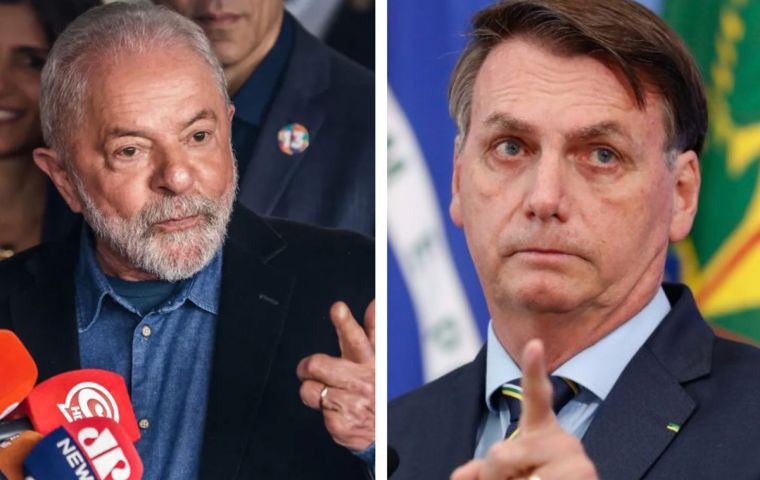MercoPress. South Atlantic News Agency
Brazil: Bolsonaro makes it to the runoff against Lula despite some polls
 Lula got 48.42% of the votes against Bolsonaro’s 43.21%. Neither candidate made it across the 50% mark
Lula got 48.42% of the votes against Bolsonaro’s 43.21%. Neither candidate made it across the 50% mark Former President Luiz Inácio Lula Da Silva of the leftwing Workers' Party (PT) edged the incumbent Jair Bolsonaro of the rightwing Liberal Party (PL) in Sunday's elections by 48.42% against 43.21% of the votes, which shows a divided country after weeks of violent incidents related to the electoral campaign.
These results after 99.94% of the polling stations were accounted for mean Brazil will go to a runoff on Oct. 30 since neither candidate crossed the 50% threshold.
Most polls had forecast Lula would win. Some spoke of a 12-percentage-point gap or even wider and even a few of them ventured the issue was going to be decided Sunday. Hence, Bolsonaro's performance is a surprising result.
In Sao Paulo and Rio de Janeiro, there were lines of up to three hours to vote at noon and other long queues were observed in the afternoon. ”There were some lines as always happens in the period from 11:30 am to 1:30 pm, but this is within normality, obviously all voters who arrive until 5 pm (20 GMT) are going to be able to vote,” explained Superior Electoral Court (TSE) Chief Justice Alexandre De Moraes during the day. “Voting has been carried out in a normal and harmonious way,” Moraes added.
As the first figures were made public, Bolsonaro took the lead. ”I bet: [pollsters]Datafolha is going to be wrong (again),“ wrote Deputy Eduardo Bolsonaro on Twitter while his father stayed at the Alvorada Palace meeting with advisors until late in the afternoon after casting his vote in Rio de Janeiro wearing a national soccer team jersey despite TSE's advise against it.
Simone Tebet, of the Brazilian Democratic Movement, and Ciro Gomes, of the Democratic Labor Party, barely exceeded 4 and 3%, respectively. The other seven contenders did not manage to pass 1%.
The bitter rivalry between Bolsonaro and Lula even resulted in supporters of either candidate attacking and even stabbing to death those of the other as unprecedented violence was recorded in the electoral process since the return to democratic rule in 1985.
Around 156.4 million Brazilians turned out to choose one president, 27 governors, 513 deputies, one-third of the Senate as well as local lawmakers.
Lula voted in Sao Bernardo do Campo, the region of Sao Paulo where he grew up as a union leader in the 1970s.
”This country needs to recover the right to be happy,“ Lula argued. ”We don't want more hatred,“ he added.
Bolsonaro, 67, ruled Latin America's largest country through the COVID-19 pandemic and is strongly supported by evangelical followers, agribusiness entrepreneurs, and Brazil's most conservative groups.
Lula, 76, left power with a high level of popularity and is still unable to shake off the stain of corruption, although his convictions in the ”Lava Jato“ scandal were overturned on procedural grounds. Released from prison in 2019 after spending 19 months in jail, he has the support of Brazil's rank and file, the women, and the young.
”During this whole campaign, we were ahead in the polls, from all the institutes, and I always thought we were going to win these elections, and I want to tell you that we are going to win these elections. This is just a reprieve for us,“ said Lula.
”We'll have to travel more, hold more events, more rallies, more debates, we'll have to talk more to people and we'll have to convince Brazilian society of what we are proposing,“ he added.
”I have never won an election in the first round. Every election I've ever fought was in the second round, all of them. What is important is that the second round is the chance for you to mature your proposals and your conversation with society. It's for you to build a range of alliances, a range of support before you win to show the people what will happen, what will govern this country,“ he also pointed out.
Meanwhile, Bolsonaro said inflation had dented the government's popularity. ”I understand that there are many votes that were due to the condition of the Brazilian people, who felt the increase in products. In particular, the basic food basket. I understand that there is a will to change on the part of the population, but there are certain changes that can come for the worse,“ Bolsonaro underlined.
”We tried during the campaign to show this other side, but it seems that we didn't reach the most important part of society,“ he went on.
”We have a second round ahead of us where everything becomes equal, the [advertising] time for each side becomes equal. And we will now show the Brazilian population better, especially the most affected class, which is a consequence of the 'stay at home, we'll see the economy later' policy, of a war out there, of an ideological crisis as well,” Bolsonaro argued Sunday evening.




Top Comments
Disclaimer & comment rulesCommenting for this story is now closed.
If you have a Facebook account, become a fan and comment on our Facebook Page!